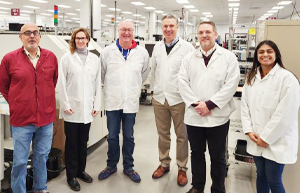| Meanwhile, in Washington, D.C. the end-of-year push to pass legislation in the U.S. Congress is in full swing, with the annual defense authorization bill securing key approval this week in the U.S. House. We will let you know if the final defense bill includes provisions affecting our industry.
Please reach out to us if you have any questions or suggestions regarding IPC’s advocacy work. We want to head into the new year with as much momentum as possible, and we cannot do it without you!
All the best, and continue to stay safe,
Chris Mitchell
Vice President, Global Government Relations
The Headlines at a Glance:
TOP NEWS OF THE WEEK
- Industry Continues to Face High Costs
- Pledge to Help IPC Advocate for Our Industry in 2023-24
QUOTE OF THE WEEK
- IPC’s Shawn DuBravac Says Manufacturing is Sustaining Amid Economic Challenges
ENVIRONMENT AND HEALTH
- EPA Proposes Changes to TSCA Fees Rule
EUROPEAN UNION
- EU-U.S. Tech Council Agree on Resiliency Concerns but Tensions Remain
- EU Ambassadors Reach Agreement on EU Chips Act
- EU Council Adopts New Reporting Rules
HELP US SPREAD THE WORD ON SOCIAL MEDIA
KEEP IN TOUCH WITH US
TOP NEWS OF THE WEEK
Industry Continues to Face High Costs: High costs are a major contributor to the murky global manufacturing sentiment, according to IPC’s November Global Sentiment Survey. The latest report shows that 80% of electronics manufacturers are experiencing rising material costs, while 77% indicate that labor costs are on the rise. Meanwhile, ease of recruitment, profit margins, and inventory from suppliers are declining. Read the full report here and let us know if you have any questions. IPC Contact: Chris Mitchell.
Pledge to Help IPC Advocate for Our Industry in 2023-24: The IPC Government Relations (GR) team is composed of experienced professionals working for you year-round. But our success depends on active participation from IPC members like you. With the November elections now behind us, our 2023 advocacy efforts are coming up soon. Please click here to confirm your contact details and pledge to stay involved in IPC advocacy. We will send you information and timely action alerts, and we will make it easy to communicate with your elected officials with just a few clicks. IPC Contact: Chris Mitchell.
QUOTE OF THE WEEK
 |
“The economic slowdown has brought demand and production back into balance and enabled many manufacturers to focus on backlogs.”
– IPC Chief Economist Shawn DuBravac examines how the manufacturing sector is holding up in IPC’s November Economic Report. |
ENVIRONMENT & HEALTH
EPA Proposes Changes to TSCA Fees Rule: The U.S. Environmental Protection Agency (EPA) recently released a proposed rule that would significantly increase fees for EPA-initiated risk evaluations of existing chemicals under the Toxic Substances Control Act (TSCA). The EPA undergoes 20 to 30 risk evaluations each year, and even if the current list of chemical substances does not apply to your company, future lists may apply, and you may be obligated to pay at that time. In March 2021, IPC responded to the EPA’s proposed rule and acknowledged the importance of the fee rule to the electronics industry. The EPA will accept public comments on the proposed rule until January 17, 2023. IPC Contact: Kelly Scanlon.
ECHA to Consider Restriction of Bisphenol A: The European Chemicals Agency (ECHA) is currently considering a German proposal that would restrict the use of Bisphenol A (BPA) and bisphenols of similar concern, which are found in epoxy resins and have utility in electronics. The ECHA will now evaluate the proposal and determine whether it conforms with the legal requirements of Registration, Evaluation, Authorisation, and Restriction of Chemicals (REACH). Is BPA essential to your electronics-related manufacturing processes or electronics products? Please let us know. IPC Contact: Kelly Scanlon.
EUROPEAN UNION
 |
EU-U.S. Tech Council Agree on Resiliency Concerns but Tensions Remain: The EU-U.S. Trade and Technology Council (TTC) held its third high-level meeting this week in Washington, D.C., aiming to strengthen transatlantic relations and address issues like global trade and supply chain concerns. The TTC found common ground on the resilience of semiconductor supply chains and reached an agreement to implement an early warning mechanism to identify and prevent semiconductor supply chain disruptions and foster information exchanges. However, disagreements remained over U.S. tax credits on electric vehicles seen as discriminatory by the European Union, Reuters reports. The TTC will hold its fourth meeting in mid-2023 in Europe. IPC Contact: Alison James.
EU Ambassadors Reach Agreement on EU Chips Act: On November 25, EU ambassadors reached on an agreement on legislation to bolster the bloc’s competitiveness and resilience in semiconductor technologies and applications. The €43 billion ($44.4 billion) agreement, called the EU Chips Act, largely mirrors the European Commission’s proposal put forward in February, but “expands the scope of what chip plants are considered ‘first-of-a-kind' and qualify for state aid,” Bloomberg reports. The text also cites packaging as an activity that can boost innovation. The EU Parliament is expected adopt its own plan in February 2023. IPC Contact: Alison James.
EU Council Adopts New Reporting Rules: The EU Council recently approved a rule aiming to strengthen the reporting requirements for sustainability information of certain large companies. The Corporate Sustainability Reporting Directive (CSRD) will require companies to publish detailed information on sustainability matters, including climate change, human rights, and other governance factors. The CSRD is expected to affect the electronics industry with regards to resources and reporting and transparency efforts across the value chain. Let us know if you have any questions. IPC Contact: Kelly Scanlon.
HELP US SPREAD THE WORD ON SOCIAL MEDIA
 |
|
 |
On November 18, the US Environmental Protection Agency (EPA) released a supplement to the proposed TSCA Fee Rule, which was initially released in January 2021. This rule provides a rationale for the fees owed from stakeholders to EPA to meet the government’s obligations under TSCA. The proposed supplement significantly increases fees to account for resources needed to implement TSCA provisions. IPC will continue to work with partners and respond to the EPA on their new supplemental proposal. |
In our ongoing efforts to better understand IPC members and the exciting changes occurring in our industry, the IPC Advocacy team recently visited the Zentech Manufacturing facility near Baltimore, MD, where we viewed their impressive, high-tech manufacturing operations. Topics discussed included the need for financing for equipment upgrades and the need for more skilled labor. This was our first on-site visit since the COVD-19 pandemic began, and we look forward to further visits to our member companies in the future. |
KEEP IN TOUCH WITH US
Meet the IPC GR Team: Whether it’s engaging with policymakers in Washington, D.C., in the European Union or in China, the IPC Government Relations (GR) Team proactively seeks opportunities to educate, inform and influence policymakers on policies that spur innovation, growth and competition, while protecting human health and the environment. But our success depends on your support and engagement. Learn more and get involved in IPC advocacy today! IPC Contact: Chris Mitchell.
Subscribe to IPC Global Advocacy Report: If you’re a member of IPC, manage your e-mail preferences and opt in to receive “Advocacy” updates. If you are not an IPC member — or you’re not sure — please send a note to friends@ipc.org, and our staff will add you to the list.
Follow us on Twitter and LinkedIn.
Contact one of us if you have any questions or insights to contribute.
See prior editions of Global Advocacy Report.
Explore our IPC Government Relations information online.
|

